Overview
The speed of the war in Iraq and the prevailing belief that the Iraqi people are better off as a result have modestly improved the image of America. But in most countries, opinions of the U.S. are markedly lower than they were a year ago. The war has widened the rift between Americans and Western Europeans, further inflamed the Muslim world, softened support for the war on terrorism, and significantly weakened global public support for the pillars of the post-World War II era — the U.N. and the North Atlantic alliance.
The Pew Global Attitudes Project surveyed: – 16,000 people in 20 countries and the Palestinian Authority in May, 2003 – more than 38,000 people in 44 nations in 2002
These are the principal findings from the latest survey of the Pew Global Attitudes Project, conducted over the past month in 20 countries and the Palestinian Authority. It is being released together with a broader survey of 44 nations conducted in 2002, which covers attitudes on globalization, democratization and the role of Islam in governance and society.
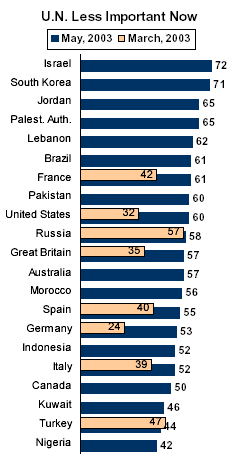
While the postwar poll paints a mostly negative picture of the image of America, its people and policies, the broader Pew Global Attitudes survey shows wide support for the fundamental economic and political values that the U.S. has long promoted. Globalization, the free market model and democratic ideals are accepted in all corners of the world. Most notably, the 44-nation survey found strong democratic aspirations in most of the Muslim publics surveyed. The postwar update confirms that these aspirations remain intact despite the war and its attendant controversies.
The new survey shows, however, that public confidence in the United Nations is a major victim of the conflict in Iraq. Positive ratings for the world body have tumbled in nearly every country for which benchmark measures are available. Majorities or pluralities in most countries believe that the war in Iraq showed the U.N. to be not so important any more. The idea that the U.N. is less relevant is much more prevalent now than it was just before the war, and is shared by people in countries that backed the war, the U.S. and Great Britain, as well as in nations that opposed it, notably France and Germany.
In addition, majorities in five of seven NATO countries surveyed support a more independent relationship with the U.S. on diplomatic and security affairs. Fully three-quarters in France (76%), and solid majorities in Turkey (62%), Spain (62%), Italy (61%) and Germany (57%) believe Western Europe should take a more independent approach than it has in the past.1
The British and Americans disagree — narrow majorities in both countries want the partnership between the U.S. and Western Europe to remain as close as ever. But the percentage of Americans favoring continued close ties with Western Europe has fallen — from 62% before the war to 53% in the current survey. In fact, the American people have cooled on France and Germany as much as the French and Germans have cooled on the U.S.
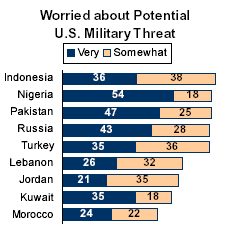
In Western Europe, negative views of America have declined somewhat since just prior to the war in Iraq, when anti-war sentiment peaked. But since last summer, favorable opinions of the U.S have slipped in nearly every country for which trend measures are available. Views of the American people, while still largely favorable, have fallen as well. The belief that the U.S. pursues a unilateralist foreign policy, which had been extensive last summer, has only grown in the war’s aftermath.
In Great Britain and Italy, positive opinions of the U.S. increased considerably since just before the war (see Chapter 1). Of the 21 publics surveyed in the new poll, overall support for the United States is greatest by far in Israel, where 79% view the U.S. favorably. Israelis also express near-universal support for the U.S.-led war on terrorism, with 85% favoring the fight against terrorism. Majorities in Western Europe and Australia also back the war on terrorism, but support has slipped since last summer in both France and Germany (15 points in France, 10 points in Germany).
In addition, the bottom has fallen out of support for America in most of the Muslim world. Negative views of the U.S. among Muslims, which had been largely limited to countries in the Middle East, have spread to Muslim populations in Indonesia and Nigeria. Since last summer, favorable ratings for the U.S. have fallen from 61% to 15% in Indonesia and from 71% to 38% among Muslims in Nigeria.
In the wake of the war, a growing percentage of Muslims see serious threats to Islam. Specifically, majorities in seven of eight Muslim populations surveyed express worries that the U.S. might become a military threat to their countries. Even in Kuwait, where people have a generally favorable view of the United States, 53% voice at least some concern that the U.S. could someday pose a threat.
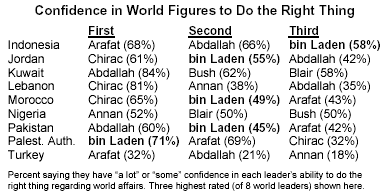
Support for the U.S.-led war on terrorism also has fallen in most Muslim publics. Equally significant, solid majorities in the Palestinian Authority, Indonesia and Jordan — and nearly half of those in Morocco and Pakistan — say they have at least some confidence in Osama bin Laden to “do the right thing regarding world affairs.” Fully 71% of Palestinians say they have confidence in bin Laden in this regard.
More generally, the postwar update survey of 16,000 respondents finds, in most countries that are friendly to the United States, only modest percentages have confidence that President Bush will do the right thing in international affairs. People in most countries rate Vladimir Putin, Gerhard Schroeder, Jacques Chirac and Tony Blair more highly than they do Bush. The president also ranks slightly behind Blair in the United States, mostly due to political partisanship. Nearly all Republicans (95%) express confidence in Bush, compared with 64% of Democrats.
War Views Entrenched

The war itself did little to change opinions about the merits of using force in Iraq. In countries where there was strong opposition to the war, people overwhelmingly believe their governments made the right decision to stay out of the conflict. In countries that backed the war, with the notable exception of Spain, publics believe their governments made the right decision. In Great Britain, support for the war has grown following its successful outcome. A majority of Turks oppose even the limited help their government offered the U.S. during the war, while Kuwaitis largely approve of their government’s support for the military effort.
Opinion about the war is strongly related to perceptions of how the U.S. and its allies conducted the war and are managing its aftermath. In countries opposed to the war, there is a widespread belief the coalition did not try hard enough to avoid civilian casualties. By contrast, solid majorities in most of the coalition countries, as well as Israel, believe the U.S. and its allies did make a serious attempt to spare civilians. Eight-in-ten Americans (82%) feel that way, the highest percentage of any population surveyed.
A somewhat different pattern is apparent in attitudes toward the postwar reconstruction of Iraq. Americans generally believe the allies are taking the needs of the Iraqi people into account. But there is less support for that point of view elsewhere, even in Great Britain, Australia and Israel. Muslim publics generally believe the United States and its allies are doing only a fair or poor job in addressing the needs of the Iraqi people in the postwar reconstruction.
There also is widespread disappointment among Muslims that Iraq did not put up more of a fight against the U.S. and its allies. Overwhelming majorities in Morocco (93%), Jordan (91%), Lebanon (82%), Turkey (82%), Indonesia (82%), and the Palestinian Authority (81%) say they are disappointed the Iraqi military put up so little resistance. Many others around the world share that view, including people in South Korea (58%), Brazil (50%) and Russia (45%).
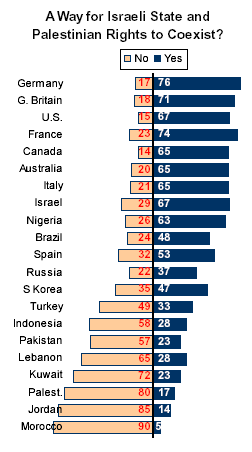
Still, even in countries that staunchly opposed the war many people believe that Iraqis will be better off now that Saddam Hussein has been removed from power. Solid majorities in Western Europe believe the Iraqi people will be better off, as do eight-in-ten Kuwaitis and half of the Lebanese. But substantial majorities elsewhere, notably in Jordan and the Palestinian Authority, say Iraqis will be worse off now that Hussein has been deposed.
The postwar update shows limited optimism for a surge of democratic reform in the Middle East. Substantial minorities of Muslims in many countries say the region will become somewhat more democratic, but only in Kuwait do as many as half predict the Middle East will become much more democratic. Expectations of major political changes in the Middle East are modest in countries that participated in the war. Just 16% in Great Britain, 14% in the U.S. and 10% in Australia think that the Middle East will become much more democratic.
U.S. Favors Israel
U.S. policies toward the Middle East come under considerable criticism in the new poll. In 20 of 21 populations surveyed — Americans are the only exception — pluralities or majorities believe the United States favors Israel over the Palestinians too much. This opinion is shared in Israel; 47% of Israelis believe that the U.S. favors Israel too much, while 38% say the policy is fair and 11% think the U.S. favors the Palestinians too much.
But Israel is the only country, aside from the U.S., in which a majority says that U.S. policies lead to more stability in the region. Most Muslim populations think U.S. policies bring less stability to the Middle East, while people elsewhere are divided in their evaluations of the impact of U.S. policies.
More broadly, the postwar survey asked people their views on the conflict between the Israelis and Palestinians. By wide margins, most Muslim populations doubt that a way can be found for the state of Israel to exist so that the rights and needs of the Palestinian people are met. Eight-in-ten residents of the Palestinian Authority express this opinion. But Arabs in Israel, who voice the same criticisms of U.S. policy in the Middle East as do other Muslims, generally believe that a way can be found for the state of Israel to exist so that Palestinian rights and needs are addressed. In fact, Arabs in Israel are nearly as likely as Jews to hold that opinion (62% of Arabs, 68% of Jews).
Outside of the Muslim world, there is general agreement that there is a way to ensure Israel’s existence and meet the needs of Palestinians. This view is widely shared in North America and Western Europe.
The poll taken amid extensive news coverage of the SARS outbreak found modest worries about the disease in the U.S. and Western Europe. But people are very worried about exposure in Nigeria (82%), Kuwait (62%), Russia (59%), and Brazil (59%).
As people around the world contemplate emerging security threats, countries in the Middle East — Iran and Syria — are viewed as less of a danger than North Korea. Majorities in most countries see North Korea as at least a moderate threat to Asian stability and world peace, while nearly four-in-ten in Australia (39%), the U.S. (38%) and Germany (37%) view North Korea as a great danger. However, just 28% of South Koreans agree that North Korea presents a major threat to regional stability. Israelis have a different sense of potential threats than do people elsewhere. More than half of Israelis (54%) say Iran presents a great threat to the Middle East, twice the proportion in the next closest country (U.S. at 26%).
Democracy Can Work Here
Despite soaring anti-Americanism and substantial support for Osama bin Laden, there is considerable appetite in the Muslim world for democratic freedoms. The broader, 44-nation survey shows that people in Muslim countries place a high value on freedom of expression, freedom of the press, multi-party systems and equal treatment under the law. This includes people living in kingdoms such as Jordan and Kuwait, as well as those in authoritarian states like Uzbekistan and Pakistan. In fact, many of the Muslim publics polled expressed a stronger desire for democratic freedoms than the publics in some nations of Eastern Europe, notably Russia and Bulgaria.
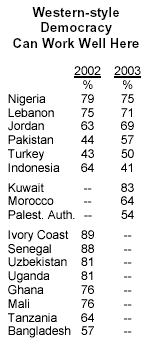
The postwar update finds that in most Muslim populations, large majorities continue to believe that Western-style democracy can work in their countries. This is the case in predominantly Muslim countries like Kuwait (83%) and Bangladesh (57%), but also in religiously diverse countries like Nigeria (75%). There are no substantive differences between Muslims and non-Muslims in Nigeria on this point. Only in Indonesia and Turkey do substantial percentages say democracy is a Western way of doing things that would not work in their countries (53%, 37%).
At the same time, most Muslims also support a prominent — and in some cases expanding — role for Islam and religious leaders in the political life of their countries. Yet that opinion does not diminish Muslim support for a system of governance that ensures the same civil liberties and political rights enjoyed by democracies.
In religiously diverse countries, Muslims generally favor keeping religion a private matter at the same rates as non-Muslims. In Nigeria, for example, six-in-ten Muslims and the same proportion of non-Muslims completely agree that religion should be kept separate from government policy. In Lebanon, there are only modest differences on this point between Muslims and non-Muslims.
U.S. Ideals Backed — Mostly
The broad desire for democracy in Muslim countries and elsewhere is but one indication of the global acceptance of ideas and principles espoused by the United States. The major survey also shows that the free market model has been embraced by people almost everywhere, whether in Eastern Europe, sub-Saharan Africa, the Middle East, or Asia. Majorities in 33 of the 44 nations surveyed feel that people are better off in a free-market economy, even if that leads to disparities in wealth and income. Despite the protests in recent years against globalization and America’s role in fostering it, people are surprisingly accepting of the increased interconnectedness that defines globalization.
This is not to say that they accept democracy and capitalism without qualification, or that they are not concerned about many of the problems of modern life. By and large, however, the people of the world accept the concepts and values that underlie the American approach to governance and business.
Americans are much more likely than Europeans to believe that most people who fail in life have them-selves to blame, rather than society.
Yet there are profound differences in the way Americans and people in other countries — especially Western Europeans — view such fundamental issues as the limits of personal freedom and the role of government in helping the poor. Americans are more individualistic and favor a less compassionate government than do Europeans and others. Nearly two-thirds of Americans (65%) believe success is not outside of their control. Except for Canadians (63%), most of the world disagrees. Among 44 nations surveyed, the U.S. has one of the highest percentages of people who think that most people who fail in life have themselves to blame, rather than society.
Accordingly, Americans care more about personal freedom than government assurances of social justice. Fully 58% of Americans say it is more important to have the freedom to pursue personal goals without government interference, while just 34% say it is more important for government to guarantee that no one is in need. In most other nations, majorities embrace the opposite view. And while most Americans support a social safety net, they are less strongly committed than other peoples to their government taking care of citizens who cannot take care of themselves.
Many Want Democracy, Fewer Have It
People everywhere are united by their desire for honest multiparty elections, freedom of speech and religion and an impartial judiciary. A fair judiciary is seen as especially important; in most countries it is more highly valued than free elections.
Yet there is a widespread sense that these democratic aspirations are not being fulfilled. In Eastern Europe, only in the Czech Republic does a majority (58%) say they have honest, multiparty elections. In Russia and Ukraine, only small minorities feel they have free elections (15% in Russia, 21% in Ukraine). Skepticism about honest elections and freedom of expression are the norm for almost all of the democratizing countries of the world, but this is especially the case in Muslim countries.
Perceptions of repression in some predominantly Muslim countries — notably Turkey and Lebanon — are as widespread as anywhere in the world. Solid majorities in both Turkey and Lebanon say their nations lack several fundamental rights: freedom of speech, a free press, fair elections and an impartial judiciary.
Soviet Hangover

In much of Eastern Europe, there is now greater acceptance of post-communist political changes compared with Pulse of Europe surveys conducted by the then-Times Mirror Center for the People & the Press in 1991, as the Soviet Union was collapsing. Even so, the legacy of communism is apparent in the attitudes of many Eastern European publics. Only about half of those in Ukraine and Russia approve of the political changes that have occurred since the collapse of the Soviet Union.
More generally, Russians and Ukrainians, as well as most other Eastern European publics, say a leader with a “strong hand” could solve national problems better than a democratic government. Only Czechs and Slovaks favor democracy over a strong leader. In most of Latin America and Africa, there is more of a preference for democracy.

There is, however, a large generation gap on views of democracy in Eastern Europe. In most Eastern European countries surveyed, people age 60 and older are much more likely to disapprove of post-communist political changes than are people under the age of 35.
“Yes” to a Smaller World
Beyond their common desire for democracy and free markets, people in emerging nations also generally acknowledge and accept globalization. People worldwide have become aware of the impact of increasing interconnectedness on their countries and their own lives. Majorities in 41 of 44 countries surveyed say that international trade and business contacts have increased in the past 5 years.
The survey finds broad acceptance of the increasing interconnectedness of the world. Three-quarters or more of those interviewed in almost every country think children need to learn English to succeed in the world today. People generally view the growth in foreign trade, global communication and international popular culture as good for them and their families as well as their countries. For most of the world’s people, however, this approval is guarded. Increased trade and business ties and other changes are viewed as somewhat positive, not very positive.
Despite the widespread support for the globalization process, people around the world think many aspects of their lives — including some affected by globalization — are getting worse. Majorities in 34 of 44 countries surveyed say the availability of good-paying jobs has gotten worse compared with five years ago. They also see the gap between rich and poor, the affordability of health care and the ability to save for one’s old age as getting worse. But people do not blame a more interconnected world for these problems — they mostly point to domestic factors. This is especially true in economically faltering countries in Africa and Latin America, such as Kenya and Argentina.
People around the world are more inclined to credit globalization for conditions they see as improving, such as increased availability of food in stores and more modern medicines and treatments.
While anti-globalization forces have not convinced the public that globalization is the root cause of their economic struggles, the public does share the critics’ concerns about eroding national sovereignty and a loss of cultural identity. Large majorities in 42 of 44 countries believe that their traditional way of life is getting lost and most people feel that their way of life has to be protected against foreign influence. There is less agreement that consumerism and commercialism represent a threat to one’s culture. However, that point of view is prevalent in Western Europe and Latin America.
The polling finds, however, that the idea of “global” forces is something of a red flag to people around the world. “Global economy” is seen as more threatening than “trade with other countries.” People worry about the impact of global trade on themselves and their families even though they believe that global trade is probably a good thing for their country as a whole.
Globalization Foes Fail to Get Through
People around the world credit globalization for conditions they see as improving, but do not blame growing economic and social problems on globalization.
People around the world generally have a positive view of the symbols of globalization. Large corporations from other countries get a favorable review in much of the world, as do international organizations.
In Africa, people express highly favorable opinions of foreign corporations, while the Middle East is more divided. Dislike of foreign firms is mostly limited to people in the major advanced economies of Western Europe, the U.S. and Canada. Even in these countries, however, positive evaluations of multinationals outweigh negative assessments.
Similarly, the impact of international financial organizations such as the World Bank, the IMF and the World Trade Organization is seen as much more positive than negative in most parts of the world. This is overwhelmingly the case in Africa. Argentina, Brazil, Jordan and Turkey stand out for their highly critical view of these institutions.
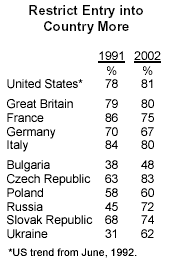
In contrast, people generally have a negative view of anti-globalization protesters. The French give higher ratings to multinational corporations than to the protesters. And in Italy, site of a major clash in 2001 between police and anti-globalization forces in Genoa, the public by nearly two-to-one (51%-27%) says the protesters are having a bad influence on the country. It should be noted that majorities in many countries declined to give an opinion of anti-globalization protesters. This is mostly the case in developing countries, but also in more advanced nations like South Korea (61%) and Japan (55%).
But “Foreign” Still a Negative
Most people in the world feel their way of life needs protection from foreign influence, and majorities in nearly every country surveyed favor tougher restrictions on people entering their countries. Overwhelming majorities in the Western European countries surveyed support tighter borders. In fact, Western Europeans expressed as much support for such restrictions as they did in the Pulse of Europe survey 12 years ago, when Europe was less unified. Eastern Europeans also have become much more wary of porous borders than when the Cold War was ending, a time when many people were more concerned with getting out of their countries than with keeping others from getting in.

In that context, Western Europeans take a much dimmer view of foreign workers from Eastern Europe, as well as the Middle East and North Africa, than they do of foreign workers from other European Union countries. This is especially the case in Germany, where 59% say Middle Easterners and North Africans who come to work in Germany are bad for the country; 53% say that about foreign workers from Eastern Europe.
This European concern about foreign influence and sovereignty also is seen in other ways. There are still sizable minorities of people in Great Britain, France, Germany and Italy who think that there are parts of other countries that really belong to them. This sentiment has not diminished — and in some cases has risen dramatically — since the end of the Cold War. Fully 63% of Russians believe that “there are parts of neighboring countries that really belong to Russia.” In 1991, just 22% agreed with that statement. Broad majorities in the Philippines, India, Lebanon, South Africa, Pakistan, Nigeria, South Korea and Turkey also feel that parts of other nations rightfully belong to their country.
As was the case in 1991, the American public has a more favorable view of ethnic and racial minorities than do Western European publics. African Americans and Hispanics are viewed much more positively in the U.S. than are Turks in Germany, North Africans in France, and Albanians in Italy.
Modern Times

People around the world are struggling with some elements of modern life, while easily accepting others. Many people say that they do not like the pace of modern life. Yet they broadly endorse the things that make life go fast, especially cell phones and the Internet.
There is significant opposition to modern commercial culture in advanced countries, where opinions about the pace of life and such modern conveniences as fast food and television are more mixed than they are in the developing world. Western Europeans and Latin Americans are most likely to express the view that commercialism represents a threat to their cultures.
Underscoring the conflicted views many people have of the modern world, people in Africa are the most likely to express the concern that their traditional way of life is being lost. Yet they also are the most enthusiastic about modern conveniences and fast food.
There also is a significant global generation gap on views of modern life. Younger and better-educated people are more comfortable with the pace of modern life. Younger people also have a better opinion of fast food and television than do their elders.
Globally, people have a broadly favorable view of birth control and family planning, with the notable exception of populations in aging industrial nations, such as Italy, Japan and Germany. Only about three-in-ten Japanese (32%) and fewer than half in Italy and Germany (41%, 47%, respectively), view birth control as a positive change. In most of the developing nations of Africa and Asia, 70% or more say birth control and family planning have changed things for the better.
Divided Over Religion, Homosexuality
Homosexuality and the centrality of religion to personal morality divide the peoples of the world. Majorities in most countries say it is necessary to believe in God to be a moral person. But Canadians and Europeans — both in the West and the East — take the secular view that it is possible to be moral without believing in God. Opinion in the United States is closer to that in most developing countries, where agreement is nearly universal that personal morality is linked to belief in God.
Americans take a less negative view of genetically modified foods than do publics in other advanced countries.
Acceptance of homosexuality divides the publics of the world in a similar way. People in Africa and the Middle East strongly object to societal acceptance of homosexuality. But there is far greater tolerance for homosexuality in major Latin American countries such as Mexico, Argentina, Bolivia and Brazil. Opinion in Europe is split between West and East. Majorities in every Western European nation surveyed say homosexuality should be accepted by society, while most Russians, Poles and Ukrainians disagree. Americans are divided — a thin majority (51%) believes homosexuality should be accepted, while 42% disagree.
Women’s increasing role in the workplace is broadly supported around the world. Large majorities in 41 of 44 countries believe the more satisfying way of life is when both spouses work and share the burdens of childcare. Pakistan, Egypt and Jordan are the only countries in which majorities believe it is better for women to stay home and take care of the children while the husband provides for the family.




